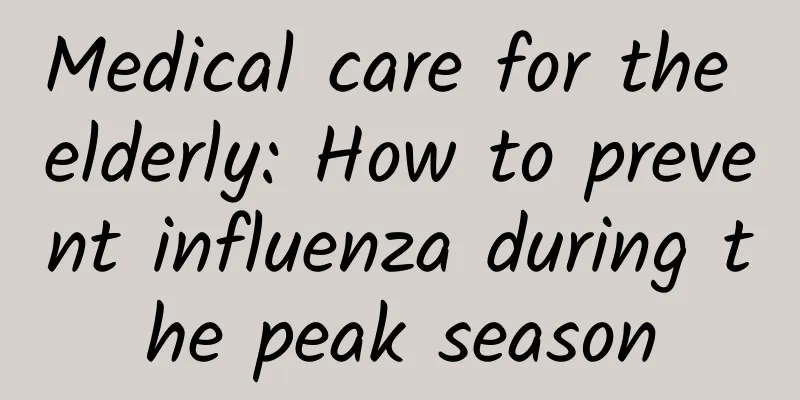Medical care for the elderly: How to prevent influenza during the peak season

|
Influenza, or flu for short, is an acute respiratory disease caused by influenza virus and is a Class C infectious disease. Clinical manifestations are mainly high fever, fatigue, headache, cough, and body muscle aches. In addition, influenza viruses are prone to mutation and are highly contagious. The general population is susceptible to the virus and the incidence rate is high. In history, it has caused multiple outbreaks around the world and is an important public health issue of global concern. The Yellow Emperor's Classic of Internal Medicine says "Prevention before illness occurs, and prevention of progression after illness occurs". Let me recommend some effective prevention and treatment measures for you. 1. Vaccination and antibody enhancement Influenza vaccination is the most effective means of preventing influenza, which can significantly reduce the risk of influenza and serious complications. Generally speaking, people over 6 months old, without contraindications to vaccination, and with chronic underlying diseases that have been stable for more than half a year can be vaccinated with influenza vaccine. In view of the current epidemic situation, key and high-risk groups should be vaccinated as much as possible: 1. Medical personnel, including clinical personnel, public health personnel and health quarantine personnel; 2. Vulnerable people and employees in places where people gather, such as nursing homes, long-term care institutions, welfare homes, etc.; 3. People in key places, such as kindergartens, primary and secondary school teachers and students, prison detention center personnel, etc.; 4. Other high-risk groups, such as: people aged 60 and above, children aged 6 months to 5 years, patients with chronic diseases, family members and caregivers of infants under 6 months old, pregnant women or women who are preparing to become pregnant during the influenza season. If you are not sure whether you belong to the group that is prohibited or cautious to use influenza vaccine, you need to go to the vaccination clinic to consult a doctor. 2. Wash your hands frequently and cover your mouth and nose Influenza viruses are mainly transmitted through respiratory droplets. Healthy people may be infected after inhaling droplets containing influenza viruses when patients or pathogen carriers cough or sneeze. Secondly, influenza viruses can also be transmitted through direct or indirect contact. For example, after touching utensils used by patients, touching the mouth, nose, and eyes with hands can also cause infection. Therefore, during the peak influenza season, you should avoid gathering in crowded public places, wear a mask when going out, wash your hands frequently to keep your hands clean, and try to avoid touching your eyes, mouth, and nose directly with your hands. 3. Early detection and prompt medical treatment The time window for antiviral treatment of influenza is relatively short. For high-risk groups, starting antiviral treatment within 48 hours after the onset of symptoms can shorten the course of fever and reduce the probability of complications. Therefore, identifying suspicious symptoms as early as possible and seeking medical treatment in time play a decisive role in the prognosis of the disease. If you have flu-like symptoms, it is recommended to seek medical attention in time and avoid contact with others. 4. Get more rest and have a good work and rest schedule A reasonable diet, enhanced nutrition, attention to rest, and maintaining a scientific and reasonable lifestyle are effective in preventing and treating influenza. Keep exercising, do more outdoor sports, and do some appropriate amount of exercise every day, such as walking and jogging, to enhance the body's resistance. In addition, adequate sleep is also one of the ways to improve immunity. Creating a quiet, warm and airy comfortable sleeping environment can help restore energy. Influenza is preventable, controllable and curable. With good personal hygiene and effective prevention, the flu is not scary! |
<<: The two-step method teaches you how to judge the risk of blood lipids
Recommend
Abdominal distension and pain after miscarriage, these problems actually occurred
Abortion is extremely harmful to female friends a...
A four-year-old boy had a big bump on his right eyebrow. It turned out to be a quail egg-sized tumor growing in his eye socket.
A four-year-old boy had a bulge on the right eyeb...
Standard weight for 1.6m girls
With the improvement of living standards, people ...
Can you get pregnant with a saddle uterus?
Young people nowadays have irregular lifestyles a...
What foods can help thicken the thin endometrium?
Thin endometrium is a common disease that has a g...
Can women eat ginger during breastfeeding?
The biggest concern for breastfeeding mothers is ...
How to identify breast lumps
Women's breasts are rich in glands and are ea...
Can I take a shower after an abortion?
Some physical illnesses or other reasons may caus...
Precautions for the sixth month of pregnancy
The happiest moment in a woman's life may be ...
What should I do if I have anal pain during pregnancy?
Pregnant women are very careful and attentive dur...
What to do if menopause has less menstrual flow?
The main cause of menstrual irregularities in men...
What causes cervical hypertrophy? What are the common symptoms of cervical hypertrophy?
Cervical hypertrophy is a symptom of chronic cerv...
What are the early symptoms of breast cancer?
Breast cancer can cause great damage to women'...
What skin care products should I use for oily skin and large pores?
People who love beauty all want to have delicate,...
What is the normal size of an ovarian follicle?
For a woman, if she wants to conceive normally, s...









